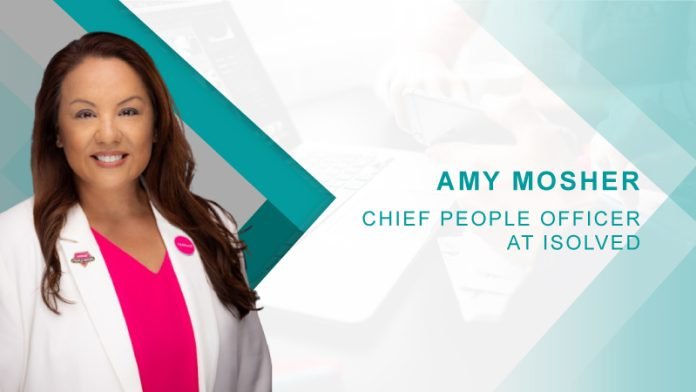Hi Amy, it’s a pleasure to have you at HRTech Cube! Can you share your professional journey and what led you to become the Chief People Officer at isolved?
I feel incredibly fortunate to have the role that I do today. Like many in our profession, it feels as though I’ve fallen into it. I was great with people, conflict resolution and empathy as a leader early in my career and thats natural DNA for the HR profession. I actually started my HR journey in Talent Acquisition, scaling a pre-IPO biotechnology company, was promoted to Hr Manager and was fortunate enough to take that business public. It was an education to go through that level of growth and change so early in my career. I believe my early success was in part due to my willingness to be brave, try new things and to fail fast, get back up and try again. As well as my interest in key business drivers and their relationship to people and culture.
At this point, I’ve been an HR professional for 25 years and spent the last 15 supporting the growth of software organizations within a private equity back environment and it’s a dream to be a part of. Mirroring my culture-first aptitudes and business acumen, I have the unique opportunity to shape the people strategy that influences business strategy and vice versa. As a member of the isolved senior leadership team, and as an HR subject matter expert, I wear even more hats. I work every day with nearly every function at a strategic level to help grow our business and its people, which is incredibly rewarding and downright fun.
With over 83% of employees discussing politics at work, why do you believe it’s crucial for organizations to proactively manage political discourse, especially during an election year?
Political conversations are often unavoidable in the workplace, especially during a presidential election year, and organizations have to be prepared to manage those discussions effectively. It requires a lot of proactive work. As a first step, business leaders should align their guidelines on political discussions with the expectations and values set by their culture. While some workplaces embrace open and transparent dialogue, others may be more reserved. Leaders should establish clear expectations, define what topics are appropriate for discussion and which should be avoided, and ensure a respectful and inclusive environment for all. Then it becomes critical for management to be consistent in how they apply those guidelines and maintain accountability at every level to foster a positive culture.
In your experience, what are some effective strategies for facilitating better political dialogue among employees while navigating potential conflicts?
At isolved, we have a transparent culture, and we value trust, inclusion and communication year-round. We have very active DEI&B values and inclusion groups that help us manage the dynamics around the election year. Those groups help ensure our employee base is educated on how to have conversations that are open, productive and understanding while keeping both professionalism and inclusion in mind.While we don’t discourage conversations about political views, we emphasize they should be thoughtful, inclusive and positive. Employers must have guidelines in place to help keep conversations constructive and create an environment where employees can have disagreements in any aspect, including politics, respectfully. We’ve found that leadership training and coaching can help defuse conflict in many cases, including identifying when employees don’t want to engage in a conversation about a sensitive topic.
How do you see the role of transparency and organizational values in shaping conversations around politics in the workplace?
Any policies or best practices about political conversation at work should ladder up an organization’s values and overall messaging. Bridging those policies with broader business messaging makes it much easier for HR leaders to set expectations and apply guidelines consistently and equitably, especially during political strife.When organizations have a very transparent culture, employees have a clear picture of how to handle political conversations professionally. In some cases, organizations might not have a policy in place for discussions on sensitive issues which requires even more open communication. For example, HR leaders can send reminders and resources to employees of best practices on how to respect diverse perspectives during this time.
Can you elaborate on how isolved emphasizes DEI values as a foundation for engaging in respectful dialogue about current issues?
Diversity, equity, inclusion and belonging (DEI&B) are a foundational part of isolved’s culture, and we really believe in the inclusion piece. Inclusivity encourages all of our employees to be comfortable enough with each other to have open discussions in areas where we may not agree with each other, including political differences. Our DEI&B efforts are not just about checking a box to keep up with trends, it’s directly ingrained in our values as a business because our people are our business.
What common challenges do managers and HR leaders face when addressing political discussions in the workplace, and how can they prepare to overcome them?
Employees may not know where to draw the line between conducting a respectful political conversation versus a political debate that’s heading in the wrong direction. When the line between the two becomes blurred, managerial or HR intervention can become necessary. Managers and HR teams need to be aware of when to take action to prevent situations that could lead to discrimination or harassment. If these situations occur, managers should feel empowered to provide timely and direct feedback. If they don’t feel empowered, proactive coaching and training on how to address these issues can be helpful within and outside of a political context. Managers should also encourage their employees to transparently communicate or ask for help if they feel uncomfortable with a situation. In many cases, these challenges can be a coaching moment for every individual involved with an interactive discussion about how to handle a situation in the future.
What personal strategies or practices do you employ to foster an inclusive and respectful environment for political discussions at isolved?
When you’re setting expectations with employees, I like to start at the top and let it trickle down, allowing leaders to share their expectations of alignment with their employees. When managers deliver these messages, they become more personal and help articulate the “why” behind political guidelines. Management teams can explain how those guidelines ladder up to our core values and answer questions from their teams in real-time. We also like to train employees on how to shut down conversations in a constructive way, whether it’s regarding a political issue or other views. We want employees to feel empowered to have open dialogue about their comfort level on sensitive issues.
What advice would you give to organizations that may be hesitant to engage in political dialogue, particularly during an election year?
My best advice for business leaders is to decide how they want to approach political dialogue in their workplace and to ensure it aligns with broader organizational messaging. Then it’s crucial to be consistent and fair in how those practices are applied. As long as you’re doing that, you’ve mitigated any risk for the organization and created a culture where you encourage fairness and equity across your business.
Looking ahead, how do you envision the role of HR evolving in facilitating workplace discussions about political and social issues?
HR is increasingly becoming a strategic part of the C-suite and looking forward I think more organizations will proactively plan ahead their approach to political and social issues. More business leaders will likely develop communication guidelines, helping employees navigate these conversations more effectively. I also believe more employees will receive standard training on constructive conversations, conflict resolution and emotional intelligence, while management teams learn more mediating skills. Ultimately, I predict HR teams will continue to be pivotal in shaping a culture that embraces and respects diverse perspectives on political and social issues.
Is there anything else you’d like to share with our readers about your approach to managing political discourse or the overall mission of isolved?
Similar to any change management or communication initiative, leading your workforce through potential conflict doesn’t start when the change happens, it starts long before that in the actions you take every day and the culture and values you uphold across your business. Communicate early and often with transparency and you will build leadership trust that will allow you navigate any hurdle that the future brings with resiliency.
Gain Invaluable Insights from HR Tech Leaders. Read Exclusive HrTech Interviews and Discover the Future of Work.

Amy Mosher Chief People Officer at isolved
With more than 20 years of global human resources experience, isolved Chief People Officer Amy Mosher has contributed to the success of multiple public and private companies across various industries, including software, biotechnology and hardware. For the last decade she has served as the Head of Human Resources with Accel-KKR SaaS software portfolio companies, including HighWire Press, Inc., KANA Software, Inc. and, now, isolved – enhancing cultures and building positive employee experiences at each.












